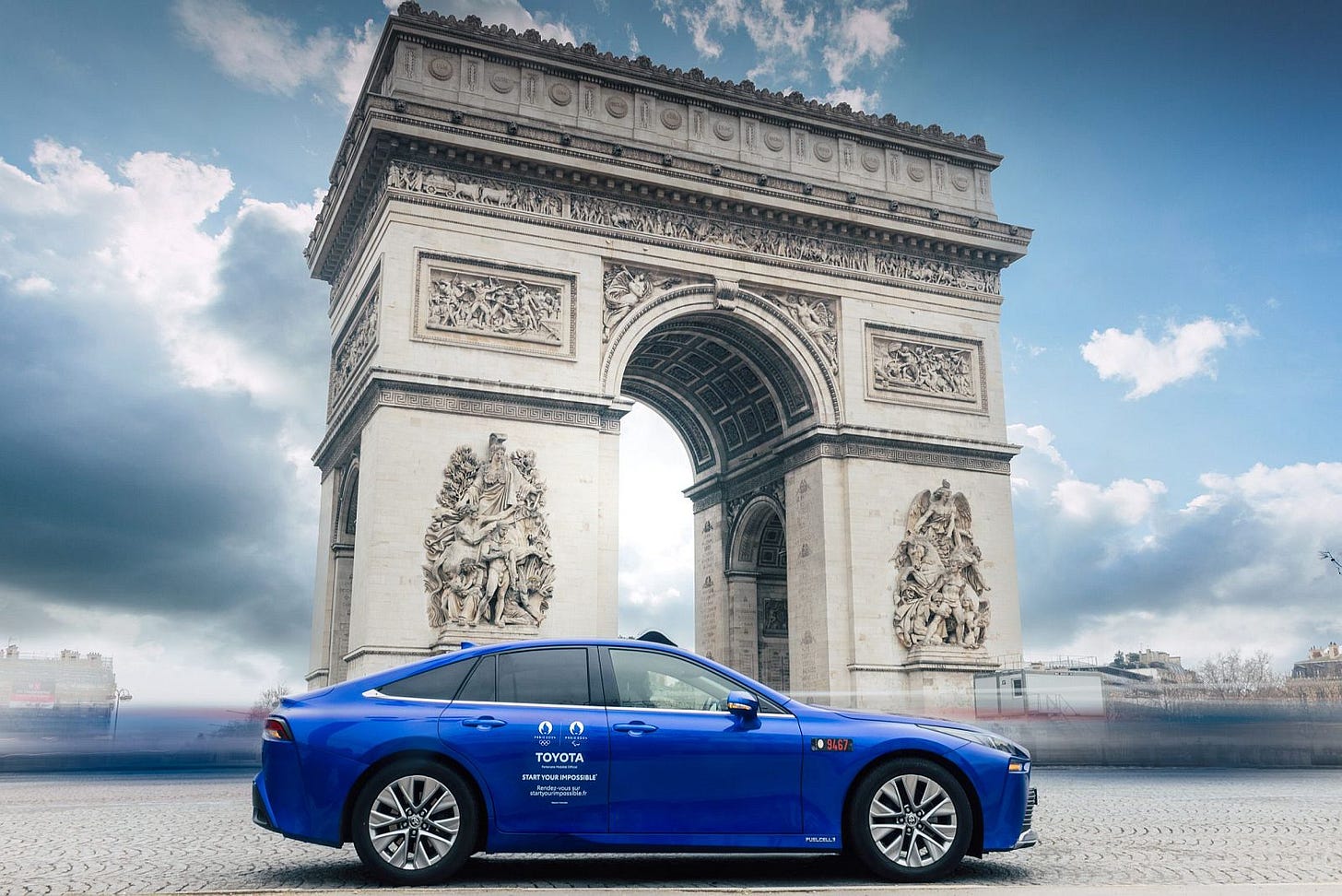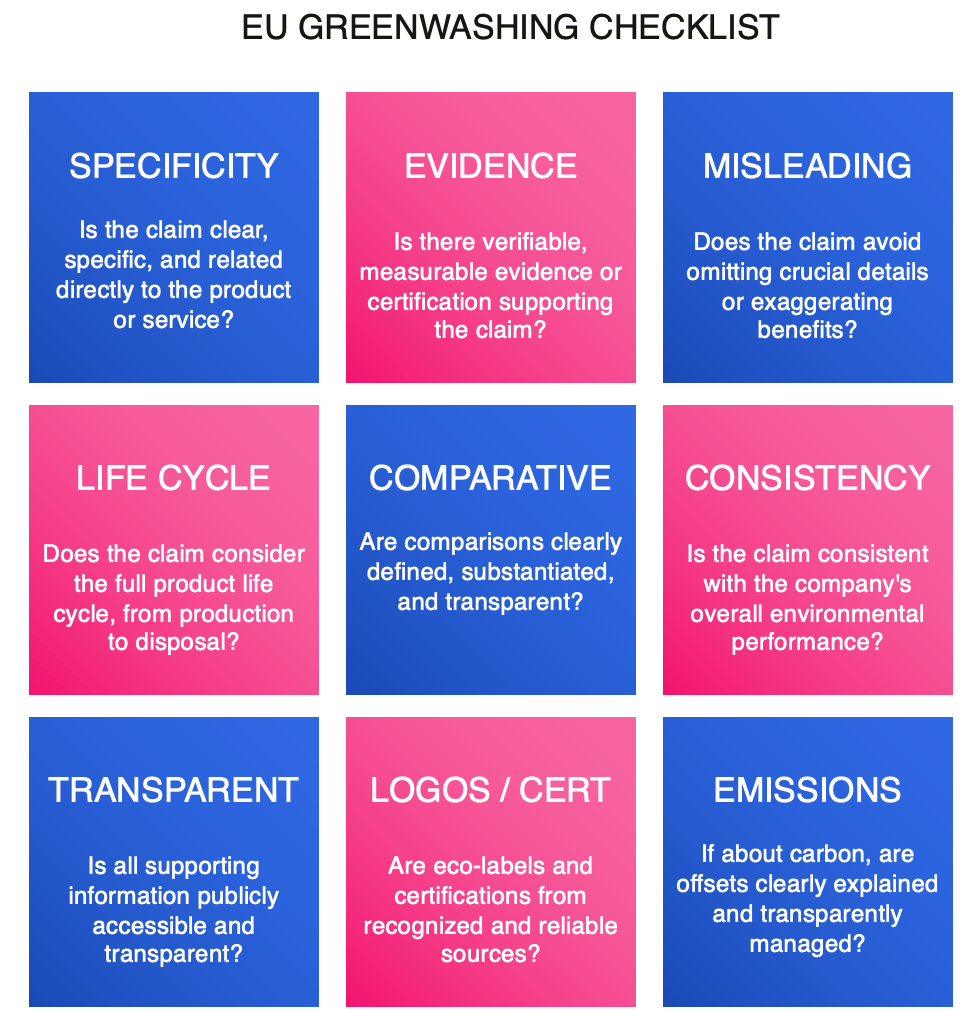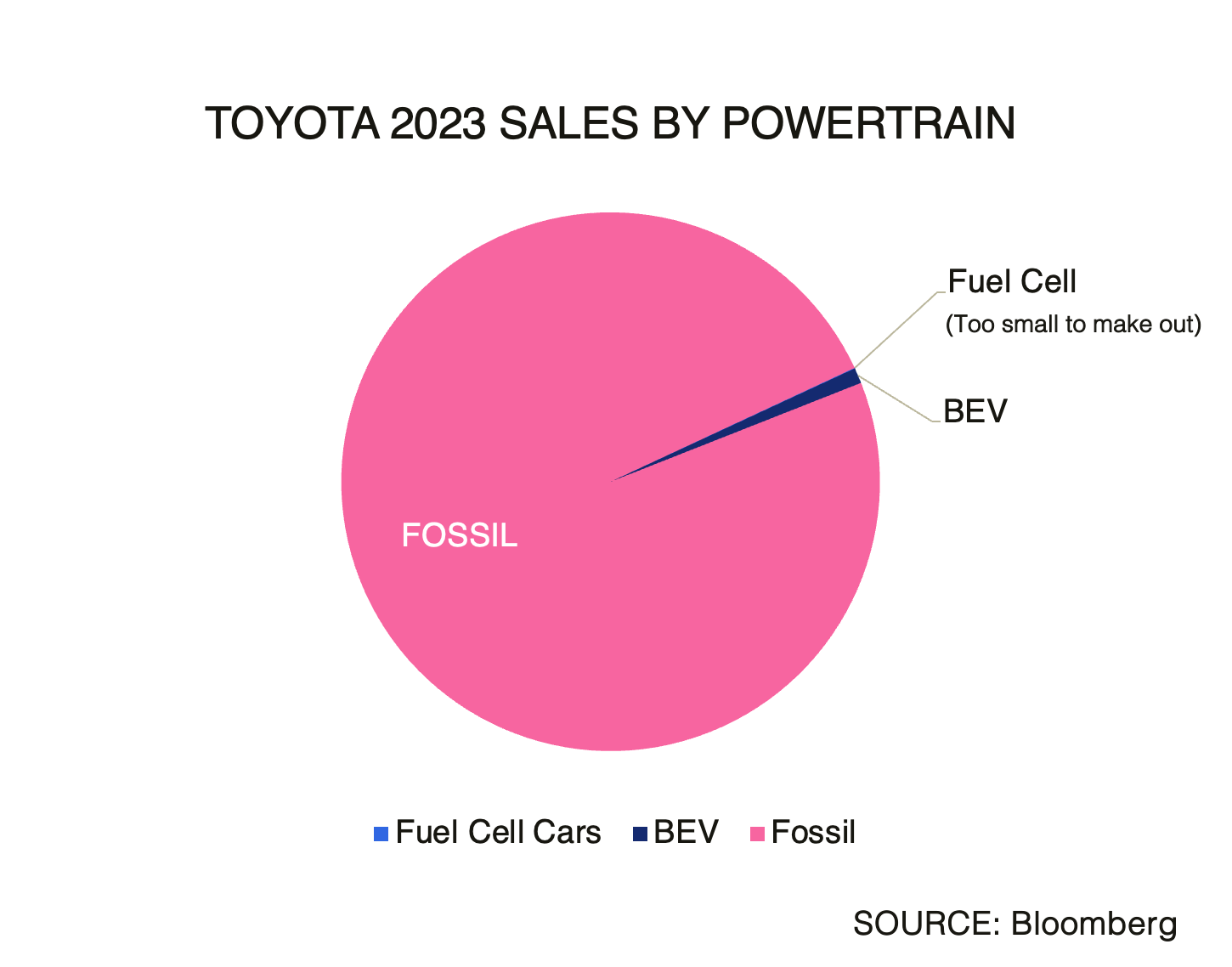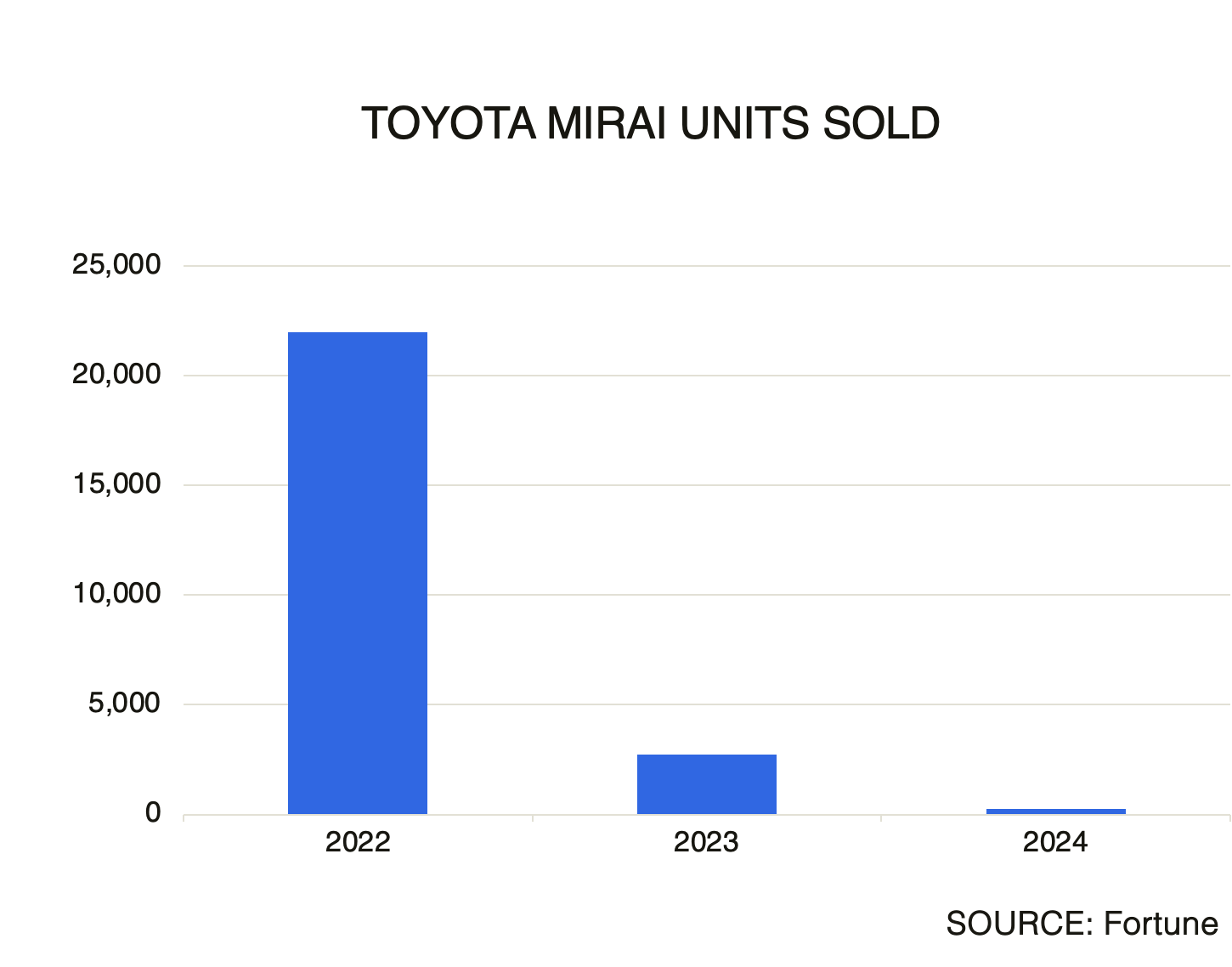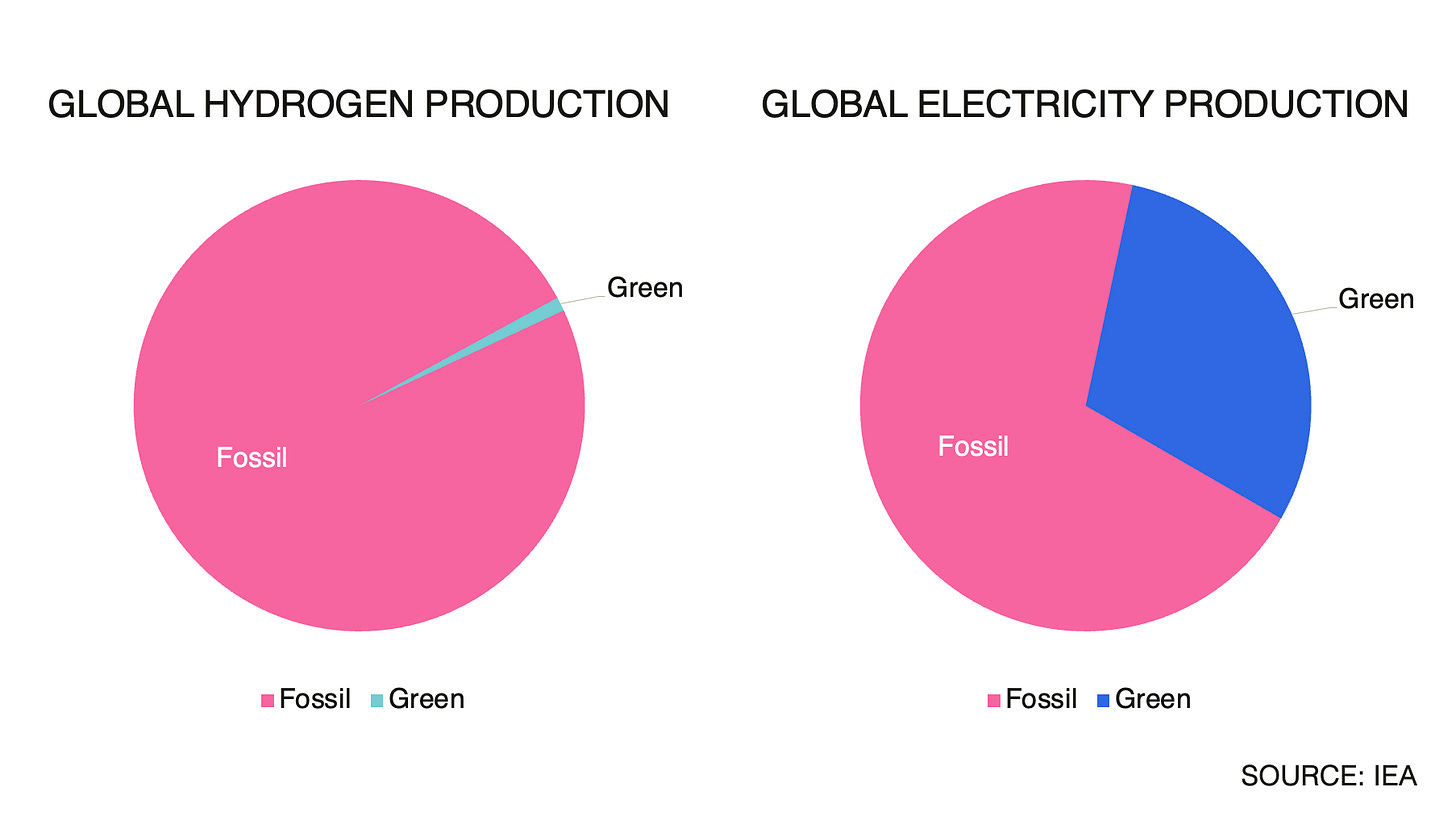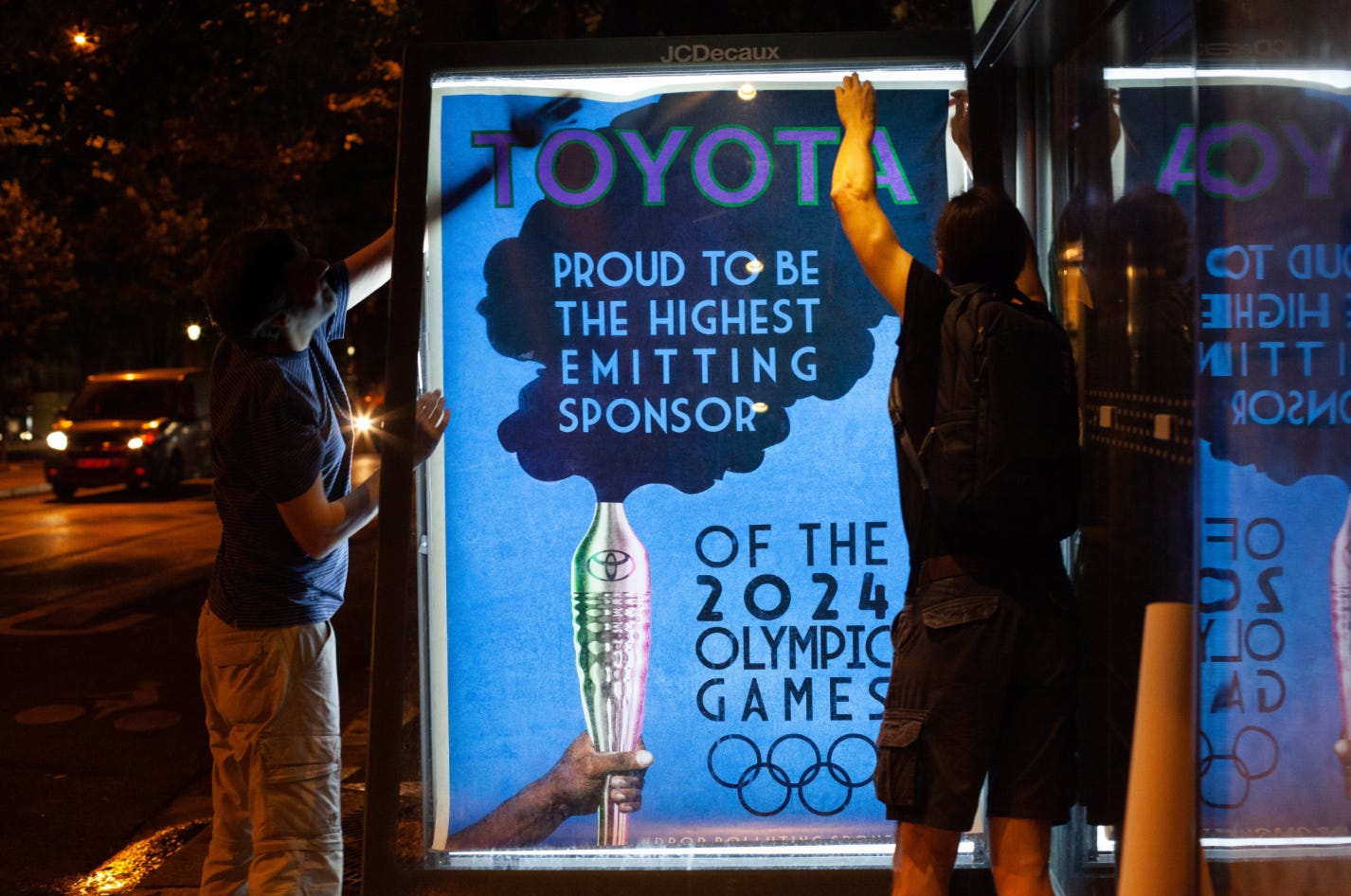Is it Greenwashing!? #1 - Toyota & The Paris 2024 Olympics
As the Paris 2024 Olympics officially concluded yesterday with the end of the Paralympics, it’s time to take a closer look at the official car of the Games in the first instalment of a new segment: Is It Greenwashing!?
As a sponsor of the Olympics and Paralympics, Toyota provided a range of vehicles, with the spotlight on the company’s Mirai hydrogen-powered cars.
The company stated:
“As the worldwide mobility partner of the Olympic and Paralympic Games, Toyota is committed to providing sustainable mobility solutions to help build a decarbonized and inclusive society.”
“Toyota believes in a multi-path approach to low-emission and zero-emission mobility, achieved through a diverse range of battery electric, fuel cell electric, hybrid, and plug-in hybrid vehicles to suit each individual’s needs.”
“The Toyota Mirai uses a hydrogen fuel cell to combine the advantages of electric mobility with comfort, autonomy, and rapid recharging. The fleet for Paris 2024 will be refueled with hydrogen from renewable sources provided by Air Liquide.”
So, is this greenwashing (and sportswashing)?
Let’s begin by examining the EU greenwashing regulations most relevant to the Olympics.
Disclaimer: I’m not a lawyer, and none of this should be considered legal advice.
Earlier this year, the EU strengthened its regulations around greenwashing, imposing strict penalties. Companies that violate these rules can face fines of at least 4% of their annual turnover. For Toyota, that could mean up to €11.41 billion.
Here’s a checklist relevant to the EU’s greenwashing regulations. This applies to any company selling a product or service in the EU—not just automotive firms - (you’re welcome).
From my perspective, Toyota's claims raise clear red flags concerning specificity and consistency. While we could dive deeper into life cycle analysis, hydrogen’s carbon intensity, or other aspects, I believe these two criteria provide the most revealing insights.
Regarding specificity, it’s apparent that Toyota is promoting their hydrogen cars not merely to offset the carbon emissions of 500 vehicles at the Olympics, but as part of their broader strategy for zero-emissions mobility. They state this explicitly when they talk about their "multi-path approach." This message is underscored by Toyota’s global sales reach — the company still sells more cars worldwide than any other manufacturer.
This leads to the consistency issue, which lies at the heart of most greenwashing accusations. A fleet of 500 hydrogen cars at the Games sounds impressive, but Toyota's hydrogen vehicle sales accounted for just 0.033% of their total sales in 2023.
Moreover, hydrogen is not a new, emerging technology that needs more time to develop. The Mirai has been on the market for nearly a decade, and Toyota has been promoting hydrogen cars since the early 2000s.
In fact, sales are declining. In 2022, Toyota sold 22,000 hydrogen vehicles globally, but in 2023, that number dropped sharply to just 2,737 Mirai units. By mid-2024, only 245 were sold.
If we zoom out further, the International Energy Agency (IEA) politely included fuel cell vehicles in its 2023 Global EV Outlook, but the global sales were a mere 8,000 units compared to almost 14 million battery electric vehicles (BEVs).
As for the hydrogen itself, the IEA reported that less than 1% of global hydrogen production in 2023 was green hydrogen (produced from renewable sources). In comparison, 30% of global electricity production was renewable in 2023, and unlike green hydrogen, it is growing rapidly.
Promoting hydrogen as a viable, scalable solution for decarbonizing light vehicles is misleading. Toyota has also publicly stated that it does not believe BEVs will ever command more than 30% of the market and is not heavily investing in them, choosing to prioritise hybrid-electric fossil fuel cars instead.
While this hybrid strategy has been successful, particularly in markets like the U.S., the automotive industry now largely agrees that BEVs are the future. Being a technological pioneer is challenging, but avoiding innovation in a highly competitive market is a losing long-term strategy.
Toyota also faced backlash from scientists for promoting hydrogen cars at the Olympics. In an open letter, 120 scientists expressed:
“We are writing to express our concern that Toyota’s promotion of hydrogen cars is scientifically misaligned with net-zero goals and risks damaging the reputation of the 2024 Games.”
Campaigners and activists also separately targeted Toyota ahead of the Olympics, including a large-scale ad-hack campaign that took over 100 advertising spaces in Paris in late July.
Toyota’s environmental track record also leaves much to be desired. Previously, the U.S. government fined the company $180 million for "longstanding violations of the Clean Air Act." Additionally, Toyota and its subsidiaries were this year embroiled in a scandal involving falsified safety and emissions data.
But back to the key question:
Is it greenwashing?
Let me know what you think.
Sources:
Toyota. “Paris 2024 Mirai Fleet.” Toyota Magazine.
Toyota. “Mobility for All – Start Your Impossible.” Toyota UK.
European Parliament. “Greenwashing: How EU Firms Can Validate Their Green Claims.” European Parliament News.
Jessica Yates. “EU Adopts New Rules on Greenwashing and Social Impact Claims.” Inside EU Life Sciences, January 31, 2024.
Jeremy Kahn. “Toyota’s Hybrid Vehicles Strategy Amid EV Hype.” Fortune, February 8, 2024.
Tristan Navera. “Why 120 Scientists Objected to Hydrogen-Powered Toyota Mirai at Paris Olympics.” Fortune Europe, July 31, 2024.
International Energy Agency. “Global Hydrogen Review 2023.” IEA.
David Fickling. “Electric Cars Are Winning Because of Buyers, Not Politicians.” Bloomberg Green, September 6, 2023.
International Energy Agency. “Renewables 2023 Executive Summary.” IEA.
Yuko Takeuchi. “Toyota Chairman Predicts Battery Electric Cars Will Only Reach 30% Share.” Bloomberg, January 23, 2024.
Lucy Kafanov. “Toyota Mirai at Paris Olympics Sparks Climate Debate.” CNN International, July 11, 2024.
Coral Davenport. “Toyota Faces Emissions Fine Amid Pushback on Electric Vehicles.” The New York Times, January 14, 2021.
Brandalism. “Paris 2024: Toyota Named Most Polluting Sponsor of the Olympic Games.” Brandalism.
Reed Stevenson. “Toyota Suspends Shipments of 10 Vehicle Models Due to Testing Issues.” Bloomberg, January 29, 2024.




